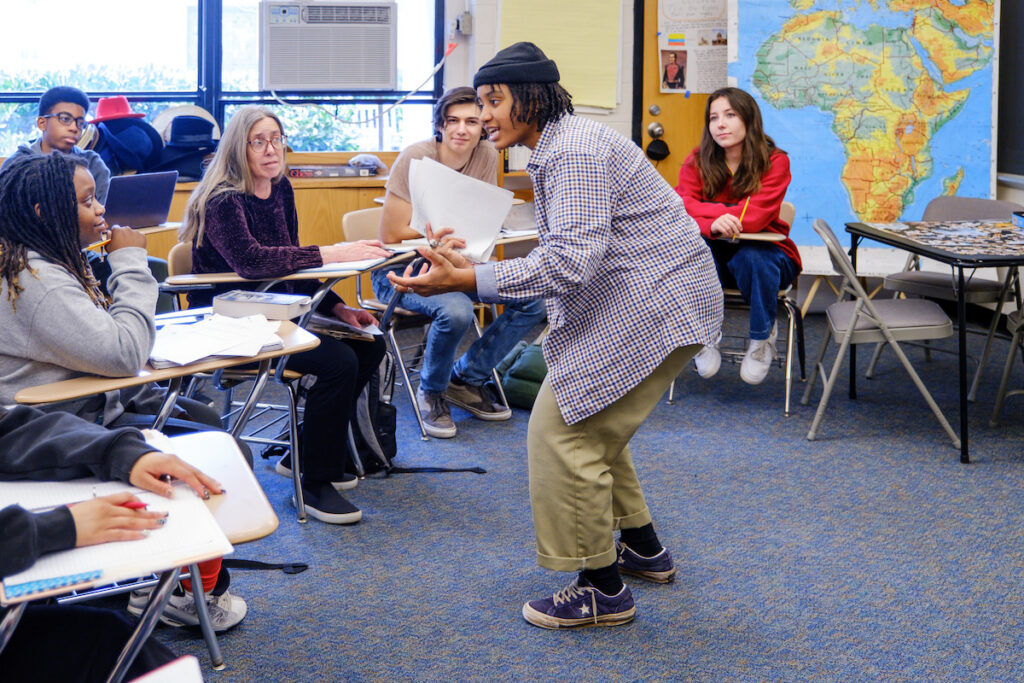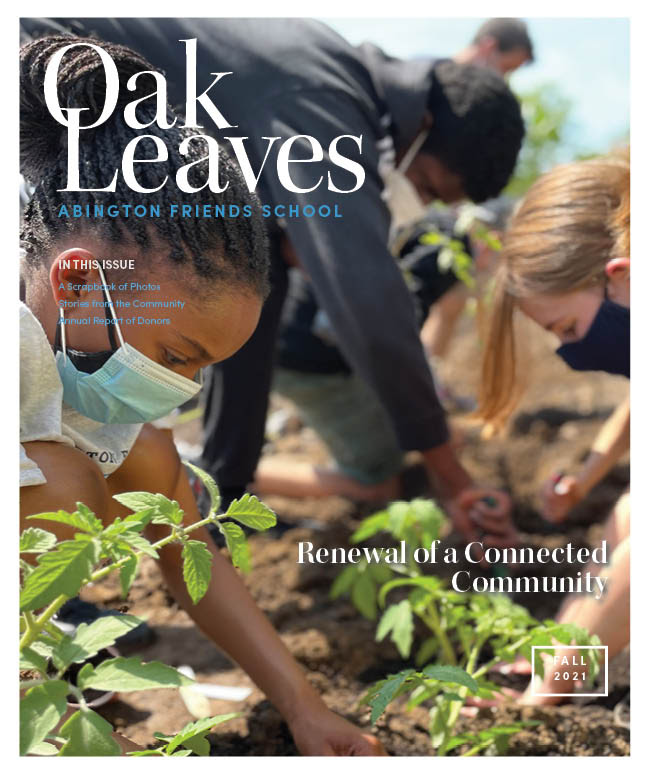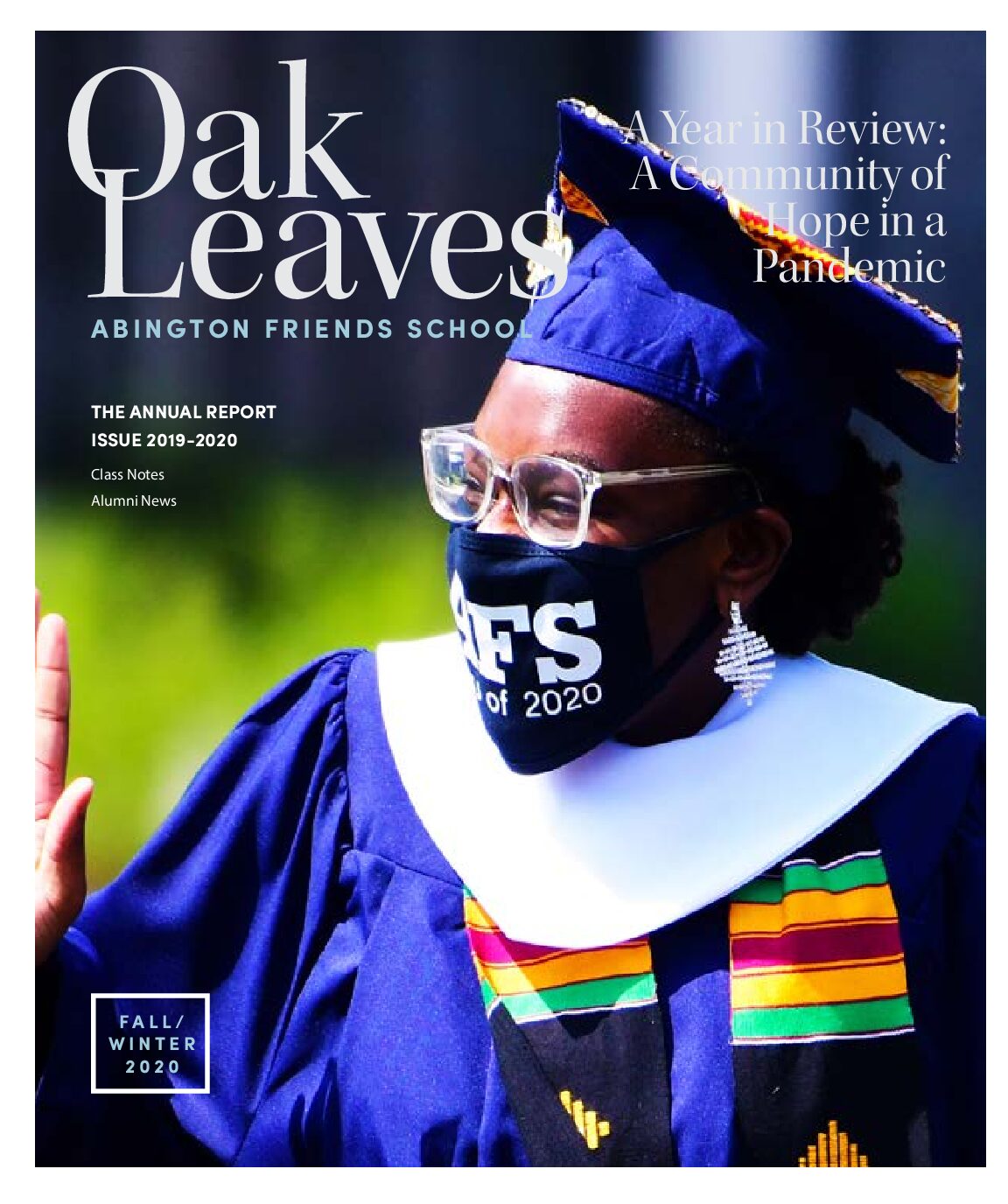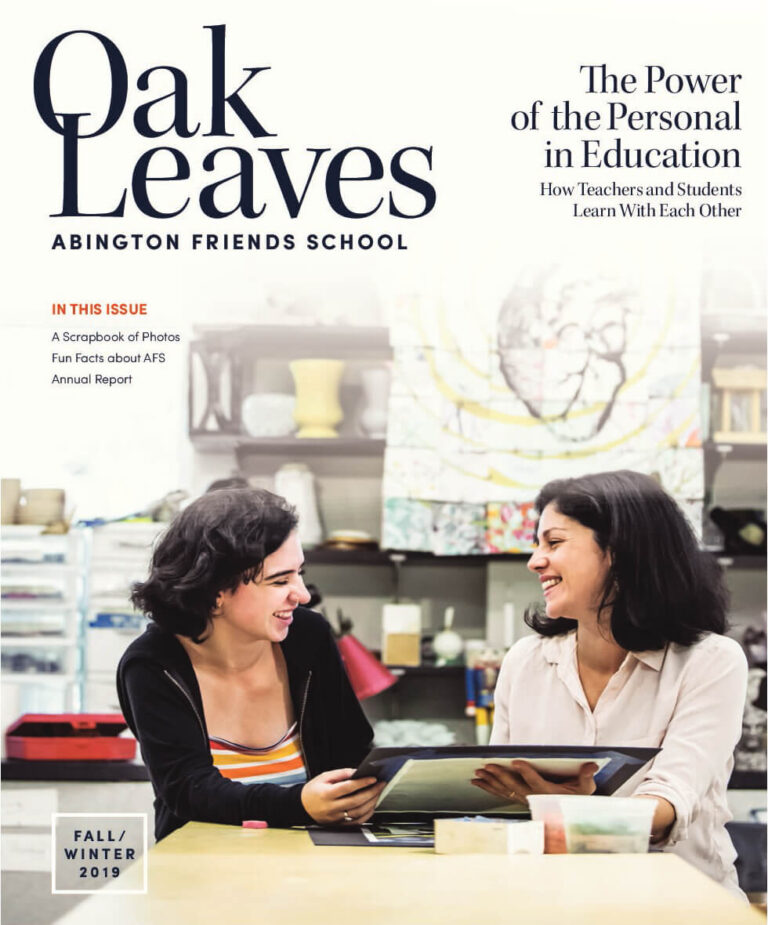Strategic Theme: Equitable Community
Constructing Lives of Purpose, Meaning and Contribution
Fully Envision and Live the Promise of Equitable, Inclusive Community

Students at AFS have embraced the chance to be a force for positive social change as they work closely with their faculty members who are forward-thinking about their teaching practices. One example of this work is in the Upper School’s History department, led by Chair Margaret Guerra. Guerra, who has been teaching history at AFS since 1997, notes that the pandemic marked a turning point, as it allowed teachers to restructure classes in partnership with students.
“My students shared how they were feeling, what motivated them, and what parts of our work resonated,” says Guerra. In short, everyone craved collaboration, which makes sense as collaboration is at the root of all meaningful learning.
In May 2020, as COVID-19 was ramping up, the movement for racial justice also took center stage in the public eye.
“Our students, whether racial justice work was always part of their lived reality or not, felt the urgency and possibility of change,” says Guerra. Throughout the 2020-2021 school year, many of AFS’ Black students shared their experiences in classes and in the world. Their strongest messages were, “Listen to us. Don’t rush to ‘fix’ [anything.] We need to see ourselves in the adults in our community and in our curriculum.”
Director of Equity, Justice and Engagement Mikael Yisreal weighed in on the importance of being intentional in building a diversity, equity and inclusion (DEI) strategy saying, “We, as a community, must be intentional about building DEI into our institutional priorities, policies, and programs. It is imperative for this work to be foundational and core, not viewed as peripheral or value added. He adds, “A true commitment to DEI stems from continuously defining and refining, focusing and refocusing our individual and institutional lens in an equitable and inclusive way; centering and celebrating our rich diversity, shared humanity, and divine dignity.”
Yisrael and the students also felt that representation in the curriculum must include Black joy, Black power and the diversity of the African diaspora. During the summer of 2021, AFS’ history department held a two-day retreat to assess what had been learned the previous year and to plan for the future. Front-and-center were questions of representation in the curriculum.
“One of the many tensions in our work is to teach honestly and openly about systems of oppression, yet allow our students to understand that people who experience oppression also experience joy and create rich lives,” says Guerra. Another component of the work is to collect primary sources by many different people, including people who had the least access to literacy and preservation of their past.
Senior Sanaa Nicholson has poured a lot of energy into DEI work during her time at AFS. As she became more immersed in the work, her knowledge and expanded thinking naturally came with her into the classroom. This shift in thinking occurred most notably in her history classes, where during each unit she repeatedly asked herself, “What were black people doing and thinking during this time?”
“The way I’d been taught history in the past was that African-Americans only existed during slavery, the Civil Rights Movement, and the Obama presidency,” says Nicholson. “Because of this lack of representation, I was fairly unengaged in what I was learning.”
Nevertheless, she never lost her underlying love for history, learning, and historical analysis. So when she was presented with the opportunity to write an independent research paper, she was extremely excited.
“I would finally be able to learn about people who looked like me, focusing on a topic of my choosing,” she says.
The following year, Nicholson became clerk for the Black Student Union. She met with Guerra and was given the opportunity to conduct an independent study during her senior year, along with her classmate Gabby Warner. Nicholson studied different approaches to black liberation as well as black joy, while Warner focused on the Black Student Movement and student activist groups of the late 1960s and early 1970s.
“Not only am I getting to look into topics about African-American history, but I am also creating lessons to teach to ninth-graders,” says Nicholson, who chose topics that focused on holding African-American history in a positive light. For example, she researched black music as a vessel for joy. She also focused on topics that had to do with the intersections of identity; this included black queer history and black art.
“I wanted to break down the narrative that there is only one way to be black. This is why the student voice is so important,” says Nicholson. “If I were sitting in history class in my freshman and sophomore years, learning about black queer womanist movements, reading Bell Hooks, or listening to rastafarian punk band Bad Brains, I would have been much more motivated and engaged with the material. African-American history created by black students makes this course special because we had control over what we would teach, what each lesson would focus on, and the lens through which it would be taught.”
Guerra notes that the energy in the room as Nicholson and Warner taught a sample class to ninth-graders was palpable.
“They provided a range of sources so students could connect the Black Student Movement to their school experience and explore how women created their own spaces in the Black Power Movement,” says Guerra. “Perhaps even more important, the students saw Sanaa and Gabby using history to explore their own stories. Giving students the skills and practice to use history to answer their own questions seems to me to be our central goal. I would not have said that 25 years ago. The continuity is that it is a goal fully consonant with our Quaker belief in the importance of each person.”
Drew Benfer, who has been teaching at AFS since 2005, knoss that human history is also filled with gender and sexuality diversity. Some schools might leave those stories untold and unexplored. Thankfully, that’s not the case at Abington Friends School.
Benfer explains, in the discipline of history, we ask, “What do we know about the individuals from the past? Did they self-identify themselves? If not, is it appropriate for us to identify them now? What sources do we use to study the individuals? What arguments do historians make about the past? What are the consequences of viewing history from a heteronormative lens or by viewing gender as a binary?”
Benfer explores these questions and many more in the semester elective “Gender and Sexuality Diversity in the 20th Century.” To prepare for the course, Benfer spoke with historians at the college level, attended conferences and participated in webinars.
“I want AFS students who identify as LGBTQ+ to know their ancestors and to see themselves in the curriculum,” says Benfer, who every year creates new amazing class content that, quite frankly, most schools wouldn’t allow even though such classes are desperately needed. For instance, he created a semester elective on Constitutional issues, especially the fight for marriage equality.
After teaching “Gender and Sexuality Diversity in the 20th Century” three times over six years, AFS supported Benfer in creating a new semester elective, “Global Perspectives of Gender and Sexuality Diversity.” Benfer and his students are working with an established journalist and author to create a companion guide to a current book on gender and sexuality diversity in the world.
“I feel fortunate to have the full support of my school as we continue to expand the offerings in the History Department,” says Benfer. “I’ll continue to connect AFS students with historians, organizations, scholars, journalists and more who are studying, documenting, archiving, and sharing the stories of LGBTQ+ individuals in the world.”


